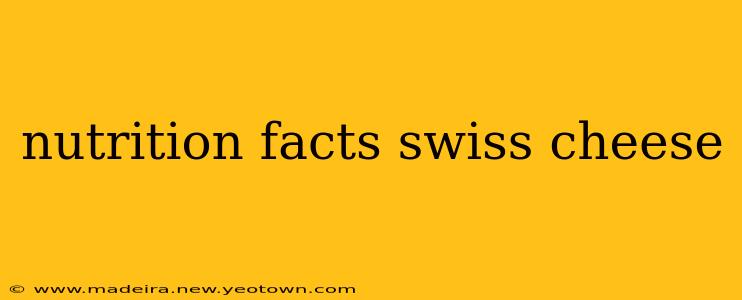Swiss cheese, with its signature holes and nutty flavor, is a culinary staple enjoyed worldwide. But beyond its delightful taste, lies a nutritional profile worth exploring. This isn't just a cheese; it's a source of essential nutrients that contribute to overall well-being. Let's embark on a journey to uncover the nutritional facts behind this beloved dairy delight.
What are the nutritional benefits of Swiss cheese?
Swiss cheese offers a compelling blend of nutrients. One ounce (approximately 28 grams) typically provides around 80-100 calories, a moderate amount of protein, and a good source of calcium. It's also a decent source of vitamin B12, crucial for nerve function and red blood cell formation, and riboflavin (vitamin B2), vital for energy production. The specific values can vary slightly depending on the brand and aging process. The longer the aging, the more pronounced the flavor and the slight changes in nutritional composition.
How much fat and protein are in Swiss cheese?
The fat content in Swiss cheese contributes to its rich, creamy texture. An ounce generally contains around 7-8 grams of fat, a portion of which is saturated fat. While it's important to be mindful of saturated fat intake, Swiss cheese's protein content makes it a valuable part of a balanced diet. That same ounce usually packs approximately 7 grams of protein, supporting muscle growth and repair.
Is Swiss cheese good for weight loss?
This is a common question, and the answer is nuanced. Swiss cheese, like many cheeses, is calorie-dense. While it's not a "weight loss miracle food," it can certainly be incorporated into a weight management plan. Its protein content helps you feel full and satisfied, potentially reducing overall calorie intake throughout the day. Moderation is key. Enjoy a small portion as part of a balanced, calorie-controlled diet.
Does Swiss cheese have a lot of sodium?
Sodium content is another important consideration. Swiss cheese generally contains a moderate amount of sodium, so individuals monitoring their sodium intake should be aware of portion sizes. The sodium content can vary based on the manufacturing process and any added salt. Checking the nutrition label is always advisable for precise information.
How does Swiss cheese compare to other cheeses nutritionally?
Compared to other cheeses, Swiss cheese often falls into a middle ground in terms of fat and sodium content. Some cheeses are higher in fat, while others may contain more sodium. The nutritional profile of Swiss cheese makes it a versatile choice, particularly for those looking for a balance of protein, calcium, and other essential nutrients without excessively high fat or sodium levels.
What are the different types of Swiss cheese?
While the term "Swiss cheese" is often used generically, there are different varieties. Some are aged longer, resulting in a sharper, more intense flavor, while others might be milder. These variations can slightly impact the nutritional content, although the overall profile remains largely similar across varieties.
This detailed exploration of Swiss cheese's nutritional profile should provide a clearer understanding of its place in a healthy diet. Remember that moderation and a balanced approach to eating are key to maintaining a healthy lifestyle. Always refer to the specific nutrition label on the product you purchase for the most accurate information.

